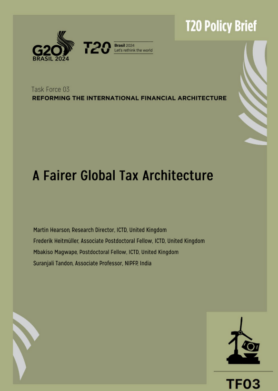T20 Task Force 03
The G20 has taken a leading role in orchestrating action by the OECD and other international organisations to maintain the coherence of global tax governance. In spite of this, discontent about international tax standards and the process through which they are set has increased in the global South. It has found its expression most recently in the UN General Assembly’s decision to begin talks on a UN Framework Convention on International Tax Cooperation (“UN convention”). This brief will build on its authors’ recent research to argue that strengthening perceived fairness and inclusivity are now essential criteria for the sustainability of multilateralism in taxation. The G20 can play a pivotal role in achieving this.
Lower-income countries (LICs) have benefited little from negotiations led by the OECD under a G20 mandate since 2008, even though they have more opportunities to influence than before. The result is a growing number of tools and standards that offers them few benefits while creating considerable administrative costs. Yet, our research has shown that they have invested in this existing work and do not wish to abandon it. In 2024, the G20 can strengthen its legacy by focusing on changes to these instruments that increase the benefits while minimising the obstacles to those benefits. This includes easier
access to multinational enterprises’ country-by-country reports, non-reciprocal exchange of tax information, and an approach to the taxation of the digital economy that enables lower-income countries to secure more tax revenue necessary for financing the SDGs.
The G20 has taken on a unique role as political orchestrator in recent years, which is needed now more than ever. Yet, this role must be recalibrated. Historically, the G20 has focused primarily on the OECD and its associated bodies as the vehicles to deliver its political agreements, but this is no longer sustainable. With global North and South currently at loggerheads over the UN convention, the G20 – created to straddle North and South – should aim to broker a political agreement among its members over the role of the UN Convention and its relationship to existing G20-mandated institutions.
